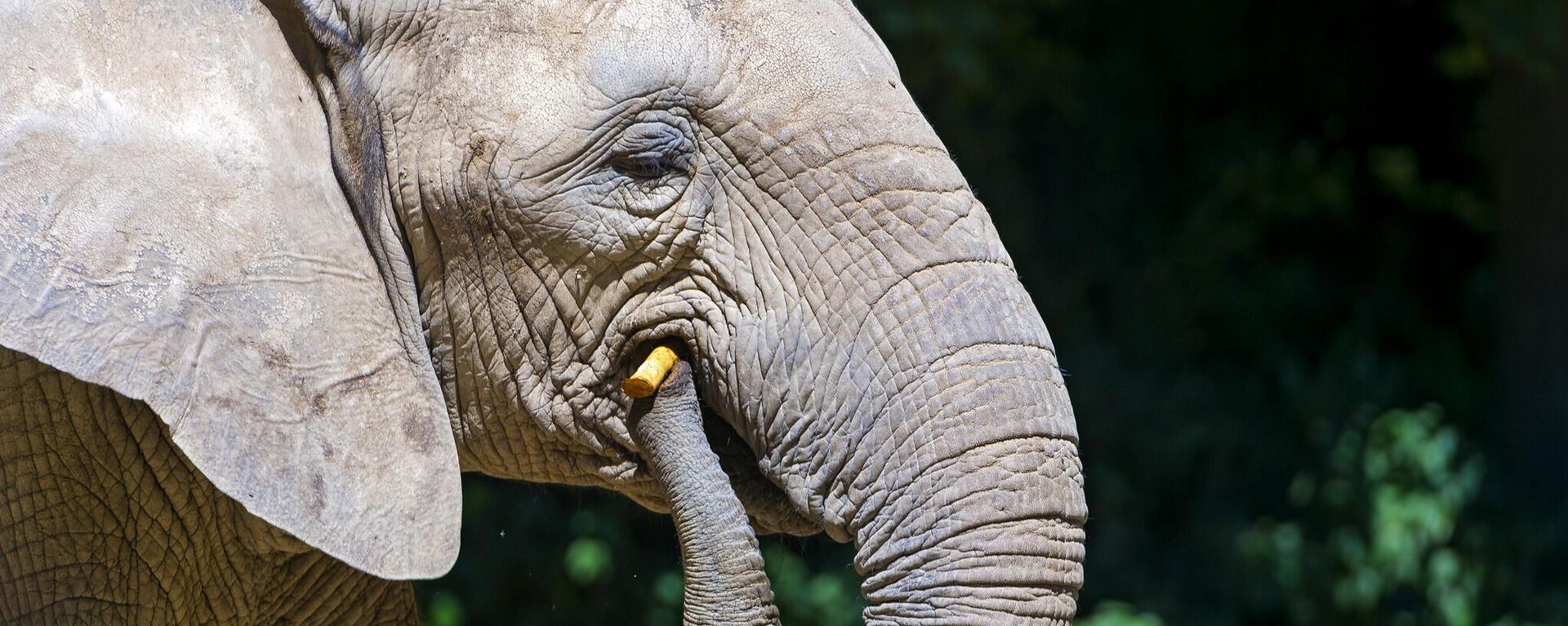https://en.sputniknews.africa/20231025/mysterious-elephant-deaths-in-botswana-cause-discovered-1063074191.html
Mysterious Elephant Deaths in Botswana: Cause Discovered
Mysterious Elephant Deaths in Botswana: Cause Discovered
Sputnik Africa
Three years ago, 350 elephants died mysteriously in Botswana, and another 35 died in similar circumstances in Zimbabwe. Elephants of all ages were affected... 25.10.2023, Sputnik Africa
2023-10-25T19:16+0200
2023-10-25T19:16+0200
2023-10-25T19:16+0200
sub-saharan africa
nature
animals' protection
elephants
international
endangered species
southern africa
east africa
west africa
central africa
https://cdn1.img.sputniknews.africa/img/07e7/0a/19/1063074848_0:161:3070:1888_1920x0_80_0_0_5c5db9ee4974e6aeedcf73ab767f4895.jpg
An international team of scientists has discovered that the neurotoxins produced by cyanobacteria, a type of microscopic algae, caused the 250 elephants in Botswana to die after they drank from large puddles that formed after rains, said the deputy director of the country’s Department of Wildlife and National Parks, Cyril Taolo, in a news conference on Monday.Based on the tests on the 35 elephants that died a similar death in Zimbabwe, the cause was a bacteria called Pasteurella Bisgaard taxon 45, which resulted in septicaemia, or blood poisoning, from the Victoria Falls Wildlife Trust, the University of Surrey, laboratories in South Africa and the UK government's Animal and Plant Health Agency (APHA).The director ruled out the possibility that the death was directly caused by humans, and that it was more likely due to changes in the environment.In 2020, 350 elephants mysteriously died in Botswana, with a further 35 dying in similar circumstances in Zimbabwe. Elephants of all ages and both sexes were affected, some of them walked in circles before suddenly dying. The situation has baffled conservationists and sparking worldwide speculation about the cause.According to Roy Bengis, a veterinary wildlife specialist at the University of Pretoria in South Africa, who formerly served as chief state veterinarian at Kruger National Park, said that there are several possible explanations for why only elephants died. Elephants drink large amounts of water, up to 40 gallons a day, so they would ingest a larger dose of the toxin than a smaller animal. In addition, unlike most other species, elephants "actually go and frolic in the water and roll in the mud and spray themselves," Dr. Bengis said. The neurotoxin could have been absorbed through their skin.The researchers warned about the impact this could have on the remaining populations of this endangered species.
https://en.sputniknews.africa/20230709/tastes-differ-elephants-change-diet-based-on-preferences-study-says-1060439102.html
southern africa
east africa
west africa
central africa
botswana
zimbabwe
pretoria
Sputnik Africa
feedback@sputniknews.com
+74956456601
MIA „Rossiya Segodnya“
2023
Samantha Arias
https://cdn1.img.sputniknews.africa/img/07e7/0a/18/1063050346_115:0:834:719_100x100_80_0_0_1682778780537fd5aa8dd2536a012c1b.jpg
Samantha Arias
https://cdn1.img.sputniknews.africa/img/07e7/0a/18/1063050346_115:0:834:719_100x100_80_0_0_1682778780537fd5aa8dd2536a012c1b.jpg
News
en_EN
Sputnik Africa
feedback@sputniknews.com
+74956456601
MIA „Rossiya Segodnya“
Sputnik Africa
feedback@sputniknews.com
+74956456601
MIA „Rossiya Segodnya“
Samantha Arias
https://cdn1.img.sputniknews.africa/img/07e7/0a/18/1063050346_115:0:834:719_100x100_80_0_0_1682778780537fd5aa8dd2536a012c1b.jpg
nature, animals' protection, elephants, international, endangered species, southern africa, east africa, west africa, central africa, world wildlife fund (wwf) , botswana, zimbabwe, pretoria
nature, animals' protection, elephants, international, endangered species, southern africa, east africa, west africa, central africa, world wildlife fund (wwf) , botswana, zimbabwe, pretoria
Mysterious Elephant Deaths in Botswana: Cause Discovered
Samantha Arias
Producer / Podcast host
Three years ago, 350 elephants died mysteriously in Botswana, and another 35 died in similar circumstances in Zimbabwe. Elephants of all ages were affected, some walking in circles before suddenly dying.
An international team of scientists has discovered that the neurotoxins produced by cyanobacteria, a type of microscopic algae, caused the 250 elephants in Botswana to die after they drank from large puddles that formed after rains, said the deputy director of the country’s Department of Wildlife and National Parks, Cyril Taolo, in a news conference on Monday.
Based on the tests on the 35 elephants that died a similar death in Zimbabwe, the cause was a bacteria called Pasteurella Bisgaard taxon 45, which resulted in septicaemia, or blood poisoning, from the Victoria Falls Wildlife Trust, the University of Surrey, laboratories in South Africa and the UK government's Animal and Plant Health Agency (APHA).
The director ruled out the possibility that the death was directly caused by
humans, and that it was more likely due to changes in the environment.
"There's absolutely no reason to believe that there was human involvement in these mortalities [...] This is not a phenomenon that was just seen now, it is something that happens quite a lot when there are these environmental changes," Taolo said as cited by media.
In 2020, 350 elephants mysteriously died in Botswana, with a further 35 dying in similar circumstances in Zimbabwe. Elephants of all ages and both sexes were affected, some of them walked in circles before suddenly dying. The situation has baffled conservationists and sparking worldwide speculation about the cause.
According to Roy Bengis, a veterinary wildlife specialist at the University of Pretoria in South Africa, who formerly served as chief state veterinarian at Kruger National Park, said that there are several possible explanations for why only elephants died.
Elephants drink large amounts of
water, up to 40 gallons a day, so they would ingest a larger dose of the toxin than a smaller animal. In addition, unlike most other species, elephants "actually go and frolic in the water and roll in the mud and spray themselves," Dr. Bengis said. The neurotoxin could have been absorbed through their skin.
The researchers warned about the impact this could have on the remaining populations of this endangered species.
"This represents an important conservation concern for elephants in the largest remaining meta-population of this endangered species," the team said.



